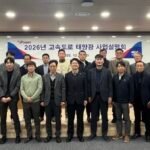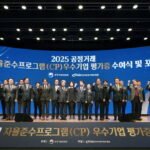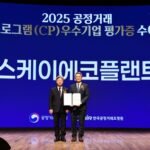South Korean institutional investors favor private credit as interest rates are expected to remain higher for longer, said speakers at the chief investment officer (CIO) panel session during ASK 2024 on Tuesday.
Korean insurers are particularly focused on managing earnings volatility under the new accounting standards, the International Financial Reporting Standard (IFRS) 9 and Korean Insurance Capital Standard (K-ICS) fully implemented since 2023, and this has increased their interest in the secondaries market.
Hyundai Marine & Fire Insurance Senior Vice President Jeon Kyung-cheol speaks at ASK 2024 on May 21
Hyundai Marine & Fire Insurance Co. prefers secondaries that can provide faster exits and private debt with steady yields, said the insurer’s Senior Vice President Jeon Kyung-cheol.
The insurance company was managing 42 trillion won ($30.7 billion) in assets as of the end of 2023. The alternative investment amounted to 12.6 trillion won, of which private equity and debt, real estate and infrastructure each made up one-third.
Hyundai Marine will primarily invest in senior secured loans via blind pool funds this year while focusing on risk management of its alternative asset portfolio, Jeon added.
The company is paying close attention to the emergence of secondaries in private debt funds. Private credit secondaries have relatively less upside potential and risks in the early redemption of high-quality assets, Jeon noted.
Hanwha Life Insurance CIO Shin Min-sik speaks at ASK 2024 on May 21
Hanwha Life Insurance Co. sees attractive opportunities in the private equity secondary market as they have lower risk than in the primary market and offer discounts, CIO Shin Min-sik said. The insurer plans to select asset managers specializing in the tech, artificial intelligence and climate-related sectors, Shin noted.
The insurance company manages 147 trillion won in assets. Alternative investment amounts to 22.1 trillion won, and private equity, private debt, real estate and infrastructure make up 16%, 8%, 47% and 28%, respectively.
Hanwha Life is considering investing in opportunistic credit and non-performing loans as well as direct lending amid market uncertainties such as rate policy and geopolitical risks, Shin said. The company also seeks opportunities in global debts including collateralized loan obligations, he added.
Korean Federation of Community Credit Cooperatives CIO Youn Jee-sun speaks at ASK 2024 on May 21
Korean Federation of Community Credit Cooperatives (KFCC) will increase its exposure to private debt in the second half of this year, with a focus on senior secured direct lending rather than distressed debt or mezzanine loans, CIO Youn Jee-sun said.
The community bank will tap into developed markets in North America and Europe and target industries with resilience in the high-interest rate environment, he added.
KFCC manages 90 trillion won in assets, about 37% of which is allocated for alternative investment.
Youn highlighted that managing the risks of the existing portfolio is more important than injecting new capital under the current circumstances of high interest rates and a strong US dollar against the Korean won.
The community bank is looking for more flexible strategies such as mitigating the J-curve, steady income from vintage years or short maturities, he noted.
Teachers’ Pension CIO Jun Beom-sik speaks at ASK 2024 on May 21
Teachers’ Pension (TP) is keeping a close watch on private credit in the primary and secondary market amid higher-for-longer interest rates, CIO Jun Beom-sik said.
The pension fund for private school teachers and employees manages 25 trillion won in assets, including 6.3 trillion won for alternative investment. Private equity and debt, real estate and infrastructure make up 40%, 30% and 30% of alternative assets, respectively.
TP will focus on profitability and liquidity this year as the pension scheme’s fund management is at the beginning of the maturity phase, the CIO said. Private debt secondaries are attractive due to their shorter duration, faster returns, purchase price discounts and diversification of region and sector, he noted.
By Jihyun Kim
snowy@hankyung.com
Jennifer Nicholson-Breen edited this article.















